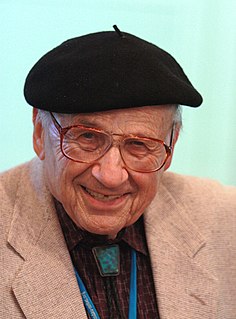A Quote by Ann Goldstein
Primo Levi's - I mean, he's a very different kind of writer. He's a much more formal writer. He's a much more -almost detached. I mean, I wouldn't really say that he's detached ultimately. But he does write as a scientist, and so he describes things very - in great detail, very carefully.
Related Quotes
Writing is very much an emotional process; it requires you to be very in touch with your feelings. That is the opposite of what you're taught as a medical doctor. We're supposed to be detached and logical. Maybe because I started off as a writer and then became a doctor, I'm able to integrate those two.
If I seem detached or distant, it's because I think this is a more exact reproduction of life, where you hide as much as you show. When I see a scene in which feelings get loudly exteriorized, I say to myself, 'Well, at least this never happens to me.' I very rarely go through this type of expression. Most of the time things are hidden or at least much more subdued.
I always wanted to be a scientist. I don't really have any writer friends. The process of being a writer is much more interior than being a scientist, because science is so reactionary. I think that all research scientists think of themselves as belonging to a grand tradition, building on work that has been worked on since the very beginning of science itself. Whereas I'm not sure writers think of themselves in the same way.
When I've taught writing to five, six, and seven year olds, it's not very different than talking to an adult writer. They're writers then, and when they get to be young teenagers they're not anymore. You might go and talk to them about writing, and they'll be very self-conscious or will have detached themselves from the group.
I am very much a scientist, and so I naturally have thought about religion also through the eyes of a scientist. When I do that, I see religion not denominationally, but in a more, let us say, deistic sense. I have been influence in my thinking by the writing of Einstein who has made remarks to the effect that when he contemplated the world he sensed an underlying Force much greater than any human force. I feel very much the same. There is a sense of awe, a sense of reverence, and a sense of great mystery.
Just write. If you have to make a choice, if you say, 'Oh well, I'm going to put the writing away until my children are grown,' then you don't really want to be a writer. If you want to be a writer, you do your writing... If you don't do it, you probably don't want to be a writer, you just want to have written and be famous—which is very different.
I did a good bit of episodic television directing, but directing a movie is so much more complicated. And there's so much more responsibility because the medium is very much a director's medium. Television is much more of a producer's writer's medium so a lot of the time when you're directing a television show they have a color palette on set or a visual style and dynamic that's already been predetermined and you just kind of have to follow the rules.
Artists talk about art in sort of straightforward terms, more like the way you talk about plumbing fixtures. Does it function well? Does it bring the hot water up from the cellar efficiently, or does it lose too much thermodynamic energy in the process? Artists are also very ruthless with each other and can be very brutal in evaluating each other's work because their criteria is almost more mechanistic. Does it do what it's supposed to be doing in an efficient way? That doesn't mean that intention is not part of the conversation, but it's not the foreground.































